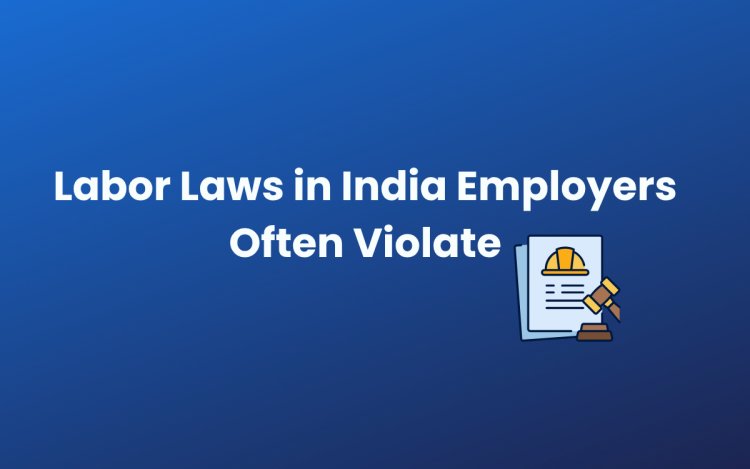Operating a business in India requires compliance with a wide range of statutory regulations. Among the most crucial are labor laws—legal frameworks designed to ensure fair treatment, safety, and welfare of employees. These aren't just formalities; non-compliance can result in fines, litigation, and damage to employer branding.
Many employers, particularly startups and SMEs, inadvertently violate these laws due to lack of awareness, improper documentation, or outdated HR practices. To help mitigate legal risk, this article outlines key labor laws in India that are frequently breached, along with typical violations and consequences.
1. Payment of Wages Act, 1936
Purpose: Ensures timely and full payment of wages to employees without unauthorized deductions.
Key Provisions
-
Wages must be paid within 7 or 10 days after the end of the wage period.
-
Prohibits arbitrary deductions or unfair fines.
Common Violations
-
Salary disbursements delayed beyond the statutory period.
-
Wage deductions for reasons not allowed under the Act.
Penalties
-
Employers may be fined.
-
Courts may order compensation or back wages to the employee.
2. Minimum Wages Act, 1948
Purpose: Mandates payment of minimum wages to protect workers from exploitation.
Key Provisions
-
Employers must pay at least the minimum wage fixed by the central or state government.
-
Wage rates vary by occupation and region.
Common Violations
-
Paying employees below the legally prescribed minimum.
-
Failure to revise wages when notified by authorities.
Penalties
-
Fines and possible imprisonment for repeat or willful violations.
3. Equal Remuneration Act, 1976
Purpose: Ensures gender pay equity and equal opportunities in employment.
Key Provisions
-
Prohibits pay disparity based on gender for the same or similar work.
-
Requires equal treatment in recruitment, promotion, and training.
Common Violations
-
Paying women less than men for identical roles.
-
Denial of promotions or training opportunities on gender grounds.
Penalties
-
Monetary fines.
-
Court-mandated rectification of salary structures.
4. Employees’ Provident Fund and Miscellaneous Provisions Act, 1952
Purpose: Facilitates retirement savings and financial security for employees.
Key Provisions
-
Employers must contribute 12% of the basic salary toward EPF, matching the employee's contribution.
-
EPF filings and payments must be made on time.
Common Violations
-
Failure to register employees under EPF.
-
Late or missed contributions.
-
Incorrect or missing employee records.
Penalties
-
Financial penalties, interest on overdue amounts, and possible imprisonment.
5. Employees' State Insurance (ESI) Act, 1948
Purpose: Provides medical, sickness, and maternity benefits to employees.
Key Provisions
-
Applies to establishments with 10 or more employees.
-
Contributions: Employer 3.25%, Employee 0.75% of wages.
Common Violations
-
Not enrolling eligible employees.
-
Delayed ESI payments.
Penalties
-
Legal action, recovery of arrears with interest, and administrative fines.
6. Employees’ Compensation Act, 1923
Purpose: Ensures compensation for workers injured or disabled due to workplace hazards.
Key Provisions
-
Compensation is mandatory for job-related injuries, disabilities, or death.
-
Applicable even in the absence of employer negligence.
Common Violations
-
Refusing compensation to injured employees.
-
Avoiding liability for workplace accidents.
Penalties
-
High compensation amounts mandated by the courts.
-
Legal consequences and liability.
7. Factories Act, 1948
Purpose: Regulates health, safety, and welfare of workers in manufacturing units.
Key Provisions
-
Limits weekly working hours to 48 hours.
-
Requires adequate lighting, ventilation, sanitation, and safety measures.
-
Mandates canteen, restrooms, and first aid facilities.
Common Violations
-
Enforcing overtime without proper compensation.
-
Ignoring health and safety standards.
Penalties
-
Monetary fines and, in extreme cases, closure of the factory.
8. Shops and Establishments Act (varies by state)
Purpose: Governs working conditions in commercial establishments such as offices and retail stores.
Key Provisions
-
Mandatory registration of establishments.
-
Regulates working hours, overtime, weekly offs, and leave policies.
Common Violations
-
Operating without valid registration.
-
Forcing staff to work on weekly holidays without appropriate overtime pay.
Penalties
-
Legal proceedings and fines by the state labor department.
9. Maternity Benefit Act, 1961
Purpose: Protects the employment rights of pregnant women.
Key Provisions
-
26 weeks of paid maternity leave for eligible women.
-
No termination during maternity leave.
-
Crèche facility for companies with 50 or more employees.
Common Violations
-
Denying maternity leave.
-
Demotion or dismissal of pregnant employees.
Penalties
-
Monetary fines and liability for compensation.
10. Apprentices Act, 1961
Purpose: Ensures structured training and development for apprentices.
Key Provisions
-
Written apprenticeship contract required.
-
Balanced emphasis on theoretical instruction and practical training.
Common Violations
-
Using apprentices for regular work without adequate training.
-
Non-payment or delayed payment of stipulated stipend.
Penalties
-
Monetary penalties and cancellation of apprenticeship licenses.
11. Sexual Harassment of Women at Workplace (Prevention, Prohibition and Redressal) Act, 2013 (POSH Act)
Purpose: Ensures a safe and harassment-free workplace for women.
Key Provisions
-
Formation of an Internal Complaints Committee (ICC) is mandatory.
-
Employers must implement a POSH policy and conduct regular training.
Common Violations
-
Failure to set up an ICC.
-
Ignoring or inadequately handling complaints of sexual harassment.
Penalties
-
Fines up to ₹50,000.
-
Suspension of licenses or cancellation of registration in severe cases.
Frequently Asked Questions (FAQ)
What are the most commonly violated labor laws in India?
Minimum Wage compliance, EPF contributions, POSH implementation, and maternity benefits are among the most frequently violated labor laws.
Is it mandatory to register a business under the Shops and Establishments Act?
Yes. Every commercial establishment must be registered under the applicable state law for lawful operation.
Can an employer deny maternity leave?
No. Denying maternity leave to eligible employees is a violation of the Maternity Benefit Act and can lead to legal penalties.
What are the consequences of non-payment of EPF dues?
Employers face penalties, interest on delayed payments, and potential imprisonment under the EPF Act.
Read it also: Labor Law Compliance Audit Checklist






